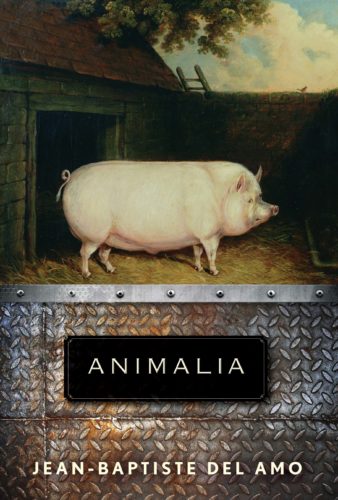Book Review: “Animalia” — ‘Taint a Fit World for Man or Beast
By Thomas Filbin
Jean-Baptiste Del Amo has written a marvelous novel in the naturalistic mode that explores how the lives of humans and animals are both interdependent and in conflict — it is not for the faint of heart or weak of stomach.
Animalia by Jean-Baptiste Del Amo. Grove Press, 384pp. $26.

For some literary critics, realism takes readers into the bedroom and naturalism leads them into the bathroom. No human activities are too sacred or profane for the latter approach, which is happy to offend delicate sensibilities. (Think Emile Zola.) Jean-Baptiste Del Amo has written a marvelous novel in the naturalistic mode that explores how the lives of humans and animals are both interdependent and in conflict — it is not for the faint of heart or weak of stomach.
The narrative is set in Gascony, southwest France, starting in 1898 and continuing through multiple generations until the initial humble pig farm grows into a huge agribusiness. At first, the Brisard family are poor and live from one day to the next, stoically battling cold, want, and hunger, with no aspirations more ambitious than seeing beyond the next sunrise. “The genetrix,” as she is called, cooks, toils, digs, and sweats, living in a manner as primitive as the pigs the family raises: “…(she) has no qualms about hiking up her skirt and petticoats and spreading her legs to relieve herself wherever she might find herself – in the middle of a field, over the gutter in a village street, even the dung heap that dominates the farmyard, her urine streaming along the ground mingling with that of the animals.”
The poverty and emptiness of such a rural existence is exacerbated by the hollowing out engendered by the First World War, which engulfs the village as the young men hurry to enlist. Del Amo sees this “patriotism” as herd behavior, cleverly placing the urge to fight in juxtaposition with the dependence of animals. Little by little, his tale reminds us of how animalistic we are despite our pretensions to be on a “noble” plane of existence we dub humanity. The genetrix’s husband, even while ill and dying, still expects his conjugal rights; these scenes are described with a sad, mechanistic cadence. The genetrix lies on her side, feigning sleep, as he enters her. His sweat, the smell of alcohol and tobacco, the general disgust she feels, is heartbreaking. Yet Del Amo keeps his distance — this is a vision of a life guided by a sense of deterministic inevitability.
When one of Eleanore’s (the genetrix’s daughter) cousins goes off to war, where he is maimed and disfigured, Del Amo deftly compares the horrors of peasant existence with that of authorized combat. Peasants, it seems, exist only to obey, as do soldiers; the difference is that farmers feed those (the powerful) who control the destinies of the underclass. Death is a matter of duty. Young soldiers going off to war try to make sense of what they are being asked to do: “Since birth they have watched killings. They have watched their fathers and mothers take the lives of animals. They have learned the gestures and copied them. . . . They have shed blood and sometimes drunk it. They know the smell, the taste. . . . But a Boche? How do you kill a Boche?”
Del Amo gives us people who are drained of everything but the will to endure. His prose is stunning from the first page on; no smell or sound or texture is omitted. Despite the often coarse occurrences, he presents a blunt, unfiltered truth, evoking the tedious existence of people with little hope — each day they are pitted against the earth, the animals, and one another for survival.
As the family farm moves into the 20th century, the business of pig farming becomes industrial. Large numbers of pigs are raised and slaughtered. They live in filthy conditions, are treated with drugs and hormones, and slaughtered en masse. Del Amo reminds us that “this is where everything goes to shit, never forget that.” Excrement becomes the overwhelming motif of life, literally as well as metaphorically. Eleanore is ancient at this point, and thinks she has lived so long only to see the cycle of meaninglessness repeated with her grandchildren and beyond.

Jean-Baptiste Del Amo — a visionary book about pig farming. Photo: Mixcloud
Animalia, although a plea for a more humane, sustainable, and respectful treatment of animals, also hints that there is something essentially unsound in how humans have set up the food chain. Pigs do not naturally live with thousands of other pigs, they do not wish to be castrated, drugged, and killed. In the end, the brutal way we treat animals brutalizes us, their captors. Del Amo suggests that the mass slaughter of beasts makes us (if we consume meat) dangerously insensitive to pain — not just to the suffering of animals, but the agony of other human beings. There is no solution to this timeless exploitation; the story ends as it began, with no stunning revelations or epiphanies. We go on as we have because this is what we have always done.
As brilliant as this book is, Del Amo did not arrive on the scene first. John Berger’s trilogy of life in rural France, Into Their Labours, begins with Pig Earth, a novel that delves into the same world, although not as graphically. Berger was a writer of rare sensibilities who looked deeply at the lives of the “simple” folk and discovered a revelatory complexity.
Del Amo has written four novels, but this is the first translated into English. Without comparing Frank Wynne’s translation to the original French, it is impossible for me to give an expert verdict, but the trenchant, graphically detailed prose here is probably not a misrepresentation of Del Amo’s art or intentions. As disturbing as this book is, as writing, it is in a class by itself. Anyone thinking about the art of description would do well to read Animalia to see how a master creates an indelible world. As for the rest of us, the novel will dampen the taste for pork, certainly, and leave us agreeing with the prohibitions decreed by Moses and Muhammad. What did pigs, after all, ever do to us?
Thomas Filbin’s reviews have appeared in the New York Times Book Review, the Boston Sunday Globe, and The Hudson Review.

